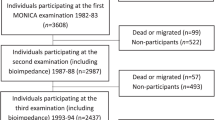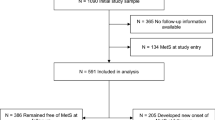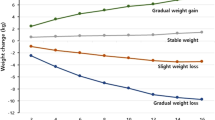Abstract
OBJECTIVE: Since the prevalence of adult obesity is increasing in the United States, we examined the effect of changing common habits (exercise, TV viewing, smoking and eating habits) on four year change in body weight.
DESIGN: A prospective cohort study of US male health professionals with follow-up from 1988–1992. Participants were 19 478 men aged 40–75 in 1986, who were free of cancer, coronary heart disease, stroke and diabetes.
METHODS: Multiple regression was used to determine the association between four year change in body weight (from 1988–1992) and common habits, after adjusting for baseline age, hypertension and hypercholesterolemia.
RESULTS: For middle aged men, vigorous activity was associated with weight reduction and TV/VCR viewing and eating between meals with weight gain. Quitting smoking and a history of voluntary weight loss prior to the study period were consistently related to weight increase. Recently being on a diet was more strongly associated with weight loss among older men. Over the four year follow-up period, middle-aged men who increased their exercise, decreased TV viewing and stopped eating between meals, lost an average weight of −1.4 kg (95% confidence interval (CI)−1.6 – −1.1 kg), compared to a weight gain of 1.4 kg among the overall population. The prevalence of obesity among middle-aged men was lowest among those who maintained a relatively high level of vigorous physical activity, compared to those who were relatively sedentary.
CONCLUSION: These data suggest that improvement in the mix of health habits, particularly increasing vigorous activity, as well as decreasing TV use and changing eating habits, results in weight maintenance or a modest weight loss over four years.
This is a preview of subscription content, access via your institution
Access options
Subscribe to this journal
Receive 12 print issues and online access
$259.00 per year
only $21.58 per issue
Buy this article
- Purchase on Springer Link
- Instant access to full article PDF
Prices may be subject to local taxes which are calculated during checkout
Similar content being viewed by others
Author information
Authors and Affiliations
Rights and permissions
About this article
Cite this article
Coakley, E., Rimm, E., Colditz, G. et al. Predictors of weight change in men: Results from The Health Professionals Follow-Up Study. Int J Obes 22, 89–96 (1998). https://doi.org/10.1038/sj.ijo.0800549
Received:
Revised:
Accepted:
Published:
Issue Date:
DOI: https://doi.org/10.1038/sj.ijo.0800549
This article is cited by
-
Short bouts of walking attenuates the response of IL-8 to prolonged sitting in healthy adults
European Journal of Applied Physiology (2023)
-
Association between weight cycling and risk of kidney cancer: a prospective cohort study and meta-analysis of observational studies
Cancer Causes & Control (2021)
-
How dieting might make some fatter: modeling weight cycling toward obesity from a perspective of body composition autoregulation
International Journal of Obesity (2020)
-
Weight change and 15 year mortality: results from the European Prospective Investigation into Cancer in Norfolk (EPIC-Norfolk) cohort study
European Journal of Epidemiology (2018)
-
Sedentary Behavior and Body Weight and Composition in Adults: A Systematic Review and Meta-analysis of Prospective Studies
Sports Medicine (2018)



